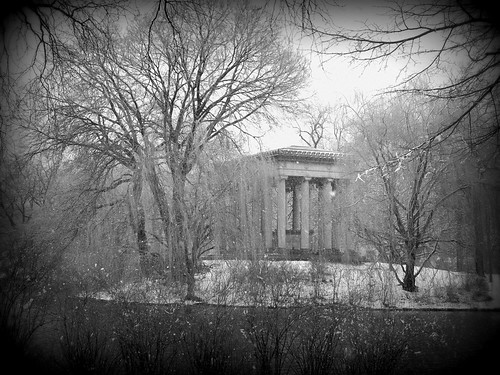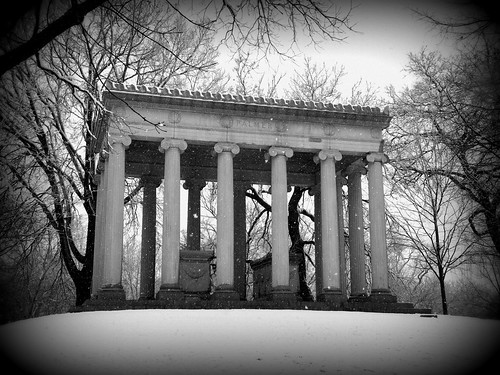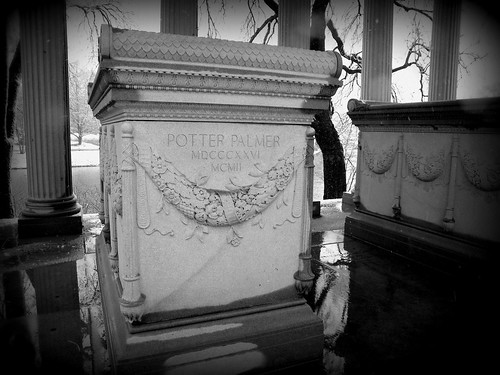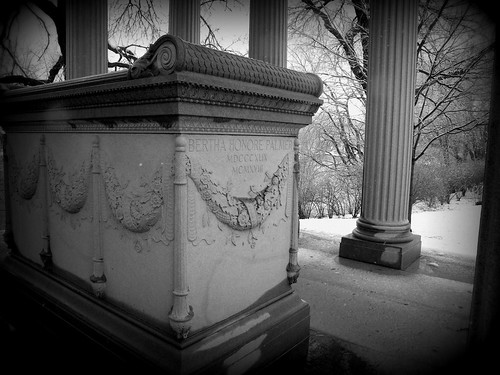(Published May 5, 1902 by The New York Times) Photos by ME
--

Chicago Millionaire Unexpectedly Passes Away in His Home.
--
Immediate Cause of Death Heart Failure - He Made a Fortune During the Civil War.
--
CHICAGO, May 4. - Potter Palmer, for nearly half a century one of Chicago's most prominent business men, died today at his residence on Lake Shore Drive. The immediate cause of Mr. Palmer's death was heart failure.
Mr. Palmer's condition had not been regarded as extremely serious, even by the family physician, Dr. Henry B. Favill. Saturday night he suffered from a fever. His temperature rose then, and by this morning was 101, but Dr. Favill, while unable to account for the presence of this fever, did not feel that it indicated serious results.
This afternoon Mrs. Palmer noticed symptoms of sinking in Mr. palmer and became much alarmed. Dr. Favill could not be found and Dr. George P. Marquis was called. He reached the Palmer residence at 4 o'clock and after a brief examination of the patient advised Mrs. Palmer that he could hold out no hope. Mr. Palmer had seemed to fall into a sleep at 3 o'clock, although it was a fatal unconscousness, and so he remained until the end.
Dr. Marquis made a vain effort to hold the wavering spark of life of the patient by administering oxygen, but it was without avail, and the end came at 5:40 o'clock this afternoon.
Just after Mr. Palmer's death Dr. Favill arrived at the residence. After a brief conference with Dr. Marquis he announced that death was due to heart failure. He discovered a slight disorder of the lungs that gave some indication of incipient pneumonia, possibly brought on by an attack of grip suffered several months ago, but not sufficient to have brough the speedy end.
Mrs. Palmer and their two sons, Honore and Potter, Jr., were with Mr. Palmer when he died. No arrangements have yet been made for the funeral, but in all probability he will be buried in Chicago.
News of the death spread rapidly over the city and intimate friends of the Palmer family called at the home early.
Old-time associates of mr. Palmer's, such as Judge Lambert Tree, Marshall Field, Levi Z. Leiter, and Erskine Phelps, were informed. Robert T. Lincoln, H. H. Kohlsaat, and R. W. Patterson called.
--
Potter Palmer was born in Potter's Hollow, Albany County, N. Y., in 1826. His father was a Quaker and a prosperous farmer there. At the age of eighteen, after receiving a common school education, young Palmer became a clerk in the store of Platt Adams, in the village of Durham, Greene County. Shortly afterward he started a dry goods store in Oneida, and a year later removed to Lockport. He was successful almost from the beginning.
In 1851 Mr. Palmer visited Chicago. The city at that time boasted of only 40,000 souls, but Mr. Palmer saw in it a place of promise. He sold his interests in Lockport, and with a capital of $6,000 opened a dry goods store in Chicago in 1852. The Chicago public liked the New York merchant and during his first year there his sales reached the satisfactory figure of $73,000.
But Mr. Palmer's great fortune came with the civil war. He foresaw that the impending struggle would interfere with production, and he spent every dollar he had on buying up cotton and wollen goods. It required several warehouses to hold his goods. His judgment proved correct. The war brought the increased prices he had foreseen, and in less than four years he had made over $2,500,000. With a fortune estimated to be all the way from $3,000,000 to $4,000,000, Mr. Palmer retired in 1865. His firm had at that time become Field, Palmer, & Leiter, the members of which were Marshall Field and Levi Z. Leiter. It was succeeded by the firm of Marshall Field & Co.
Mr. Palmer subsequently began to interest himself in real estate transactions. He determined to make State Street, then little more than a wide alley, the principal thoroughfare of Chicago. Within six months he had bought three-quarters of a mile of frontage on that street. He succeeded in having it widened. When the great fire came in 1871 Mr. Palmer had ninety-five fine buildings in the city, including the Palmer House. All were destroyed in that conflagration.
Only a year before the fire Mr. Palmer married the woman who has become well known the world over. She was Miss Bertha Honore, daughter of H. H. Honore. Mr. Honore went to Chicago from Louisville, and his daughter had all the beauty for which Kentucky women are famous. When the fire had given his fortune a great blow Mr. Palmer felt at first inclined to withdraw the remnant of it and leave the work of rebuilding the city to others. During a great conversation he had with his wife at that time he made known to her his desire to leave the ruined city. "Mr. Palmer," replied Mrs. Palmer, "it is the duty of every Chicagoan to stay here and devote his fortune and energies to rebuilding this stricken city."
Mr. Palmer acted upon the advice of his wife. No man contributed so much to the resurrection of the city as did Potter Palmer. As soon as possible after the fire the work on Palmer House was resumed. It was completed at a cost of $2,000,000, the result being the handsomest and most substantial hotel in the country at that time. He rebuilt many other large buildings, and his real estate holdings continued to increase in value, until today his fortune is estimated at $25,000,000.
Mr. Palmer was one of the most active promoters of the World's Fair. He gave $200,000 to the Women's Building there. His wife was President of the Board of Lady Managers at the Columbian Exposition. Mr. Palmer was a Democrat, and was several times mentioned as a possible candidate for Mayor of Chicago.
------------------------------------
Funeral of Potter Palmer
(Published May 8, 1902 by The New York Times)
CHICAGO, May 7. - Hundreds of Chicagoans, representing all classes, from laborer to millionaire, attended the funeral of Potter Palmer here today. Services were held at the Palmer residence, where many friends of the dead millionaire and Chicago pioneer viewed his remains. The Rev. James S. Stone, rector of St. James's Episcopal Church, conducted the services. The burial was at Graceland Cemetery.
------------------------------------
Potter Palmer (May 20, 1826 – May 4, 1902) was a Chicago businessman who was responsible for much of the development of State Street.

Potter Palmer founded a dry goods store on Lake Street in Chicago in 1852, Potter Palmer and Company. Unlike many stores of the time it focused on women and encouraged their patronage. Palmer also instituted a "no questions asked" returns policy, which served to nurture the goodwill and patronage of Chicagoans.

When Palmer's doctor urged him to get out of the business in 1865 because of ill health, he brought in partners Marshall Field and Levi Leiter. The trio joined forces and renamed the firm Field, Palmer, Leiter and Company. In 1867 sold his share of the partnership and focused his efforts on his real-estate interests, leasing a new building to his former partners in 1868 at State & Washington.
Potter Palmer built several buildings along State Street on property he owned, including the Palmer House Hotel. When his buildings were destroyed in the Great Chicago Fire, Palmer borrowed $1.7 million to rebuild, the largest amount lent to an individual up to that time.

In 1871, Potter Palmer married Bertha Honoré. In 1874, she gave birth to son Honoré, and in 1875, she gave birth to son Potter Palmer II. Both sons went on to have sons named Potter Palmer III, as well as other children.
Potter built a castle for Bertha on Lake Shore Drive in 1885, leading to the establishment of the "Gold Coast". Prior to that time, Prairie Avenue was the most desirable address in Chicago.
Death of Potter Palmer





1 comment:
This is awsome history :D
Post a Comment